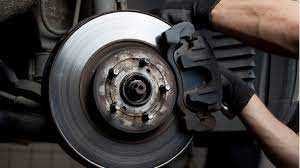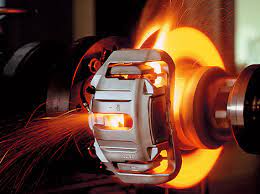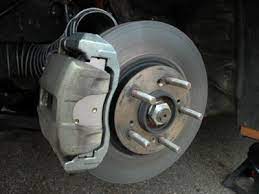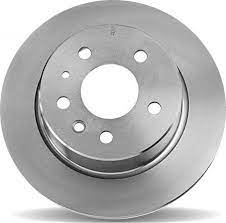Why Are the New Brakes Squeaking & How Do You Fix It?
The truth is it is still possible that you might hear brakes squeaking even after you have had them replaced. In this article we will discuss some of the reasons that new brakes may still squeak. We will also look at some of the solutions to this issue.
Why Are the New Brakes Still Squeaking?
You are likely feeling frustrated as you may have paid out money you can ill afford to make sure you have working and preferably quiet brakes. Take a deep breath though because this squeaking sound may not be as ominous as it seems.

Moisture
The problem could be as simple as moisture build up on your brake pads and rotors. This can happen after it rains or if it is especially humid. Realistically it is not a big issue. All you really need to do is drive for a little while and after a few braking events it should dry up and get nice and quiet again.
What you need to remember is that worn brakes will squeak every time you brake. If it is only happening when you first start out in the morning and then stops it is probably moisture based and not anything to be concerned with.
The New Pads are Breaking In
Brand new brake pads can take a little bit of use before they are fully broken in and working as they should. If you go to a mechanic they may run the brakes through their paces and break them in for you.
If you have changed your own brake pads you will have to break them in yourself. This will require light driving and slow gradual brake application. A great place to do this is an empty parking lot.
Until your new brakes are broken in they may squeak and they may not have their full biting potential. If you also changed the rotors at the same time it is even more likely that you will need to break in the new parts.
Pushed too Hard too Early
As mentioned brakes need to settle in somewhat when they are new so you should not be looking to push them too hard to start with. This means avoiding steep inclines and heavy towing loads. When you push new brakes too early they can quickly overheat and as a result you may hear squeaking noises.

When brakes have had a chance to wear in a little more they can better handle steep inclines, towing and you riding the brakes. Essentially you want to go easy on them in the early days until they reach their optimum working state.
Cheap Brakes
There’s no polite way to put this but you get what you pay for these days and if you had to opt for cheaper parts you may pay the price later. You might not get squeaking straight away but after a while of working you may find the brakes start to squeak prematurely.
The cheaper option may be better for your wallet now but they will wear out more quickly and you will be replacing them again sooner than you might be prepared for.
A Stuck Caliper
The brake pads and rotors may be brand new but you can still hear squeaking even after the new parts should be well worn in. This may mean that a caliper pin has become stuck. These pins need to contract so that the pads can be released from the rotors.

When a caliper pin sticks it may leave part of the pad stuck to the rotor causing a squeaking sound as you drive along. If both of your caliper pins stick you might also get a burning smell along with the noise. You will be wearing out your brakes quickly so getting these caliper pins unstuck is important.
Worn Rotors
You do not always have to change pads and rotors at the same time in fact rotors tend to last far longer than pads. It is possible however that you change the pads but the rotors are worn out as well and should have been changed.
You should always check both the pads and rotors to determine which needs replacing or if both should be. Servicing them at the same time will likely cost less than changing them months or weeks apart.
Problematic Signs From Your Brakes
Squeaking right after changing your brake pads does not have to be a big problem but there are some issues that can be. In this section we will talk about some concerning things to look out for.
Grinding Sound
This is a sound that you should definitely hear after replacing your brake pads. You may hear grinding when the pads are so worn that the metal below them is grinding against the metal of the rotors. This is not good at all.
If you get grinding brakes after a replacement something is very wrong and it needs to be looked at straight away.
Brake Pedal Vibration
This is a physical sign of an issue such as stuck calipers and presents as a vibration as you press the brake pedal. You may also receive a brake warning light and a smell of burning due to the stuck caliper.
As a rule of thumb you should not feel vibration through the brake pedal so if you do then you need to get them checked out quickly.
How to Fix New Brake Noises
Dry Out the Brakes
You're not going to take a hairdryer to your brakes on a humid morning to avoid squeaking that would be frankly ridiculous. To fix this issue you simply need to drive for a little while and the action of using the breaks will evaporate any moisture.
As mentioned earlier if the squeaking does stop after a while things are great. If however it persists you need to look into this more deeply.
Break in the Pads
As mentioned if you have the new brakes fitted by professionals they will do the job of breaking them in. If you have gone the DIY route then you will also have to perform the break-in process.
Slow driving and gentle braking will help burn off the first few layers of brake pads. This will help get them to their peak performance level.
Cool the Pads Down
If it is early days with your brake pads and you may have been pushing them a little hard and they start to squeak you may need to give them a break. The simple solution here is to pull over and rest the brake pads for a while allowing them to cool off.
Over time as the brakes wear in they will handle strain much better and you won't have to do this but to start with use some common sense.
Replace Cheap Pads
If you decided to save money and go for cheap parts and you have already developed squeaking when you brake you may need to bite the bullet and get some better quality parts. Inexpensive brakes will wear out faster although they shouldn’t do so too quickly.
Replace Other Parts as Needed
If you are just changing your brake pads there is no harm in looking at the calipers and rotors at the same time. If they are showing signs of wear or look like they may be about to fail you may want to change them at the same time.

Brand new brake pads will not last as long if you have caliper issues or bad rotors. Sometimes it’s worth the extra cost to have well performing brakes that will not require work for a long time.
Conclusion
You can sometimes still have squeaking brakes even after you have changed the brake pads. This can be due to moisture, needing to break in the new pads or pushing them too hard too early. You may also have issues with your brake calipers and rotors.
Link To or Reference This Page
We spend a lot of time collecting, cleaning, merging, and formatting the data that is shown on the site to be as useful to you as possible.
If you found the data or information on this page useful in your research, please use the tool below to properly cite or reference Tow Ratings as the source. We appreciate your support!
-
<a href="http://towratings.net/blog/why-are-the-new-brakes-squeaking-how-do-you-fix-it/">Why Are the New Brakes Squeaking & How Do You Fix It?</a>
-
"Why Are the New Brakes Squeaking & How Do You Fix It?". Tow Ratings. Accessed on April 20, 2024. http://towratings.net/blog/why-are-the-new-brakes-squeaking-how-do-you-fix-it/.
-
"Why Are the New Brakes Squeaking & How Do You Fix It?". Tow Ratings, http://towratings.net/blog/why-are-the-new-brakes-squeaking-how-do-you-fix-it/. Accessed 20 April, 2024
-
Why Are the New Brakes Squeaking & How Do You Fix It?. Tow Ratings. Retrieved from http://towratings.net/blog/why-are-the-new-brakes-squeaking-how-do-you-fix-it/.